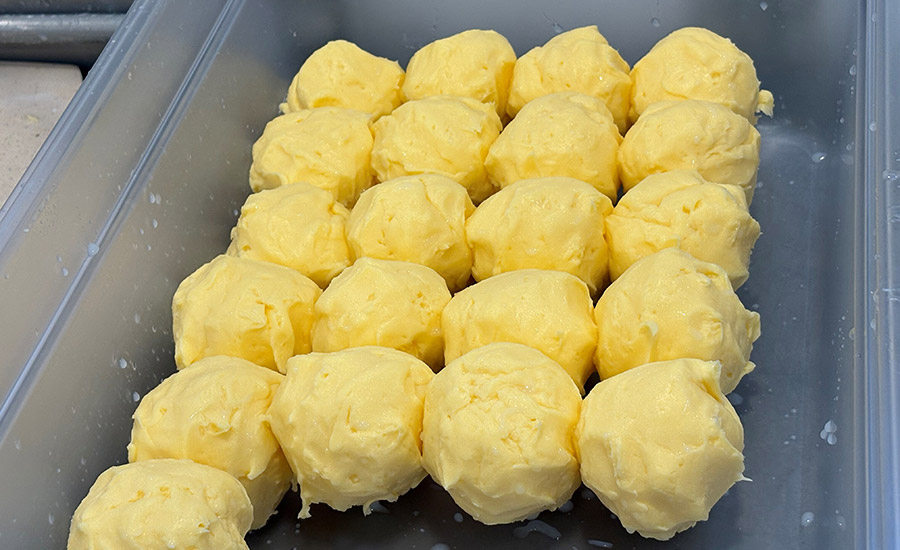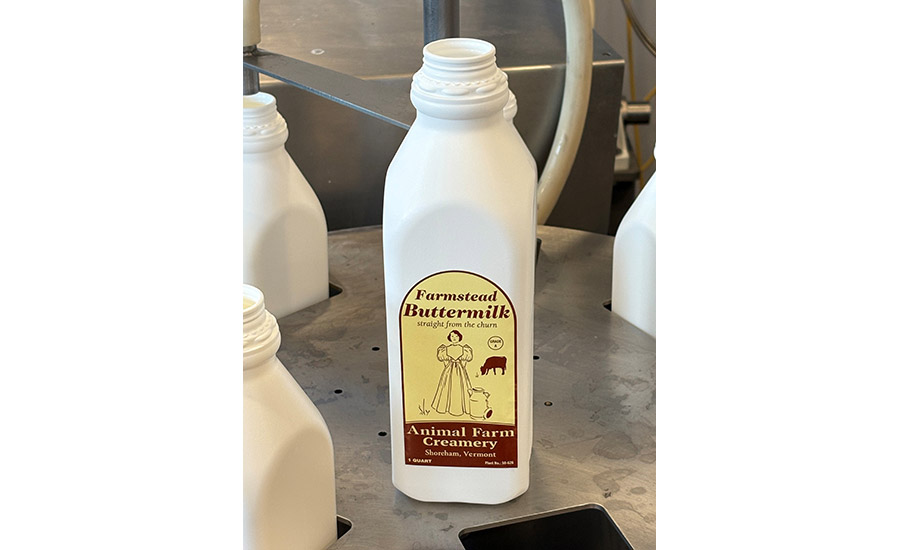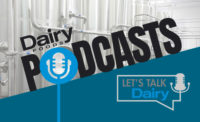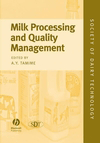Animal Farm Creamery gets “thumb’s up” from “The Bear”
Vermont-based processor’s butter was alluded to on the TV show.

Ben Haigh and Hilary Haigh are joined by their son Emitt.
Photos by Brian Berk
“I have a bill in my hands for $11,268 for butter,” “The Bear’s” James Kalinowski, played by Oliver Platt, says. “Buddy, what is it, the rare … Transylvanian five-t….d goat? We cannot … keep this up!”
“It’s Orwellian,” responds Carmen Berzatto, portrayed by Jeremy Allen White.
“It’s dystopian butter?” Kalinowski asks.
“No, Orwellian. Orwell, Vt.,” Berzatto states.
“Vermont? Of course. I am going to send them 20 … grand,” Kalinowski responds and storms out of the kitchen.
We are talking about a fictional scene from “The Bear” Season Three, Episode 3, which aired on June 26 on Hulu, and took place at about the 10:55 timestamp of the show. The product mentioned in the show may be fictional, but the butter most certainly is not.
We should know: Dairy Foods visited the family who makes the butter that is the talk of many restaurants throughout the United States: Animal Farm Creamery. Although the plant is not in Orwell itself, it is located in the bordering town of Shoreham, Vt., flanked by Lake Champlain and Ticonderoga, N.Y., directly to the west; Rutland, Vt., about 45 minutes to the south; and Burlington, Vt., 1.5 hours and Montréal three hours to the north. Today, the creamery is owned by the Haigh Family: Hilary, Ben, and their three children: William, Emitt, and Leland.
At the creamery, the business produces cultured butter and buttermilk. “Those are the only two things. It is enough,” Hilary Haigh maintains. “There are so many possibilities. I have had a dream of processing ice cream. But it means I would be spending every minute of my time in the creamery. We love the farming side of the business as well. I love the balance of spending time in the creamery, with animals, and with our three kids.”
Celebrity Chef Thomas Keller, who made a cameo appearance on “The Bear,” is the biggest customer and fan of Animal Farm Creamery. He makes sure it is served at his three-Michelin star restaurants, the French Laundry in California’s Napa Valley and New York City’s Per Se.
“We sell to three restaurants in San Francisco and the French Laundry in Yountville, so that is four locations in California. We also sell to restaurants in Virginia and the new Raffles Hotel in Boston, and of course to Chef Keller’s restaurant Per Se in New York City,” Haigh mentions. “All of the restaurants are ordering butter every week in 10-, 20- or 30-pound boxes.”
What makes Animal Farm Creamery butter so impressive to celebrity chefs and consumers alike? There is no secret, Haigh asserts. “It all comes down to labor. It’s the cleaning, attention to detail, the herd, land, and feed management that all make this butter what it is,” she explains. “The butter is rich, fragrant, smooth, yet light in mouthfeel and changes with the seasons. In the winter, the butterfat is high, the texture firm, and the color a pale yellow. As the cows transition to grass, the butter transforms to a marigold yellow, softer in texture with notes of summer grasses and legumes.”
Having a farmstead butter operation, especially one of its small size, is unique and allows Animal Farm Creamery to cater strongly to its cows and obtain a very high-quality of cream. “Cow health, management, breed (Jersey), and cleanliness are what make the high-quality cream,” Haigh mentions. “We are also able to handle cream very gently with our hand skimming instead of a cream separator. We pasteurize at the most minimum temperature to preserve the flavors in the cream (and without adding others) and help prevent as many fat globules from breaking up as possible.

“Our two-person operation keeps the communication between the creamery and the dairy seamless, and this is what brings our butter to the next level of quality,” she adds.
Communication with the chefs is another key component. “I speak with the chefs about us, our farm and keep them updated as the butter changes through the seasons. They really appreciate the communication and the dedication to our craft. They relay our story to their guests for the complete experience while people are eating our butter,” Haigh reveals.
Animal Farm’s history
In February 2022, the Haigh Family purchased the Animal Farm Creamery business from Diane St. Clair, who founded it in 2000, and therefore inherited several of St. Clair’s clients. St. Clair lives in Orwell, Vt., and George Orwell of course wrote Animal Farm. Animal Farm Creamery was named after George Orwell’s book, Haigh reveals.
“Diane started with one cow. Thomas Keller was blown away by the quality of the butter, so Diane quickly expanded to three cows, four cows, and more.”

Hilary and her husband Ben did not specifically grow up as dairy processors. Ben’s uncle has an organic farm in Shoreham, where Ben worked for several years to get the requisite experience. Hilary also worked at that farm for a period of time.
The Haigh Family founded Rolling Bale Farm in 2014, which sells meat and poultry. But they always had an itch to be involved in dairy. Beef and lamb are still sold via that business.
“We love dairy. We have built a lot of things on our property and everything has come together since we bought the Animal Farm Business,” Hilary stresses. “When we moved to this farm in 2016, all we had was an old farm house, two very small barns and 30 acres of land that had been corn ground and hay land for neighboring farms for years.
“Since our purchase, Ben has built and renovated eight barns, all from his portable sawmill, grant funding and patience. With funding from NCRS (Natural Resources Conservation Service), Ben has built miles of fence on our property and the other 250 acres of pasture and hay land, which we have picked up over the years,” Hilary continues. “We are slowly getting our fields and pastures fertilized and back into shape. We use compost from our bedded packs and try to purchase in some amendments annually. Our farm, which hasn’t seen productive livestock in 50 years, is slowly coming back to production.”
The Haigh Family’s efforts are definitely paying off. Animal Farm Creamery does not need to partake in any advertising, as word of mouth is a strong driver of business. “We get a lot of interest in our butter from chefs who are looking for a high-quality domestic butter. Our butter compares to a European style and is appealing as table butter,” Hilary notes. “All of the chefs we are working with are making their breads in house and are pleased to have a high butterfat product that is loaded with aroma, flavor and light texture, like they might get from France.”

The butter is so popular that Animal Farm Creamery does not even need any branding when shipping it to clients. In fact, Buttermilk is the only place an end user would see the Animal Farm Creamery brand name.
Haigh does acknowledge there was one big adjustment her family had to make when purchasing Animal Farm Creamery: working with high-end chefs for the first time. “I had not done that before, so I did not know what to expect. I talked to them all on the phone during the transition in 2022, and they were thrilled to know that the product and story would be continuing.” Haigh mentions. “Some thought Diane would shut down the business when she was ready to stop working. She was very specific about the quality of the butter.”
State of the restaurant business
Serving a high-end restaurant business has been great for the hard-working Haigh Family. However, restaurant attendance is definitely economy driven. The restaurant business was of course hit extremely hard during the COVID-19 pandemic, and any future economic recession could again damage the industry.
“That is always a concern,” Haigh relays. “We have thought about what we would do if too many restaurants had to close, and I think it would work to sell our butter directly to consumers. This would involve more time packaging, labeling, shipping and computer time, but it would allow us to continue farming.”
Drastic times call for drastic measures. In the case of a drastic economic downturn, Haigh acknowledges Animal Farm would also need to renovate its website from its current landing-page format to a prominent eCommerce operation.
“But I hope it never comes that. We love the current plan we have in place,” Haigh concludes. “To both be making our living as farmers feels right and fulfilling, but the concept of this being a rarity in this day and age is not lost on us.”
Looking for a reprint of this article?
From high-res PDFs to custom plaques, order your copy today!










